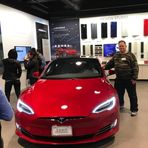The Paradox of Musk: Embracing Trump While Clinging to Subsidies
August 13, 2024, 3:39 am

Location: Netherlands, North Holland, Hoofddorp
Employees: 10001+
Founded date: 2021
Total raised: $331.53M

Location: United States, Texas, Austin
Employees: 10001+
Founded date: 2003
Total raised: $3.86B
Elon Musk is a man of contradictions. He dances with the political elite while simultaneously feasting on the very subsidies he publicly scorns. His recent endorsement of Donald Trump, a candidate who promises to dismantle the electric vehicle (EV) subsidies that helped Tesla rise to prominence, raises eyebrows. Musk’s actions reveal a complex interplay between ideology and pragmatism, leaving many to wonder where his true loyalties lie.
Musk’s endorsement of Trump comes at a time when the former president’s policies threaten the very foundation of Tesla’s success. Trump’s rhetoric includes calls to “drill, baby, drill” and to end the electric vehicle mandate. Yet, despite this, Tesla continues to lobby for government benefits that are often championed by the Democratic Party. It’s a classic case of biting the hand that feeds you.
Tesla’s rapid ascent in the EV market is no accident. Government loans, tax breaks, and favorable policies have been instrumental in its growth. Musk may publicly reject subsidies, but behind the scenes, Tesla is actively seeking them. In a recent filing with the U.S. Environmental Protection Agency (EPA), Tesla urged the Biden administration to allow California to implement stricter vehicle emissions rules—something Trump vehemently opposes. This is not the first time Musk has played both sides of the political fence.
The irony is palpable. Musk, who once criticized Trump for dismissing climate change, now finds himself aligning with a figure who has shown little regard for environmental policies. In 2017, Musk resigned from White House advisory panels after Trump withdrew from the Paris Agreement. Back then, Musk was a champion of sustainable energy. Fast forward to today, and he’s endorsing a candidate who would roll back many of the advancements he once supported.
Musk’s relationship with government support is a pragmatic one. He may express disdain for subsidies, but when they’re available, he’s quick to take advantage. This duality is evident in Tesla’s lobbying efforts. In a filing with the U.S. Department of the Treasury, Tesla argued that sustained government support is essential for transitioning away from fossil fuels. The company has also benefited significantly from selling regulatory credits, raking in nearly $9 billion since 2018. This is a clear indication that while Musk may publicly criticize government intervention, he is more than willing to capitalize on it.
The recent endorsement of Trump has sparked debate among Tesla shareholders. Some argue that Musk’s support for the former president contradicts the interests of a company that is pivotal for clean energy. Musk’s actions suggest a willingness to sacrifice short-term gains for long-term ambitions that extend beyond Tesla. His interests span various sectors, from artificial intelligence to space exploration. For Musk, Tesla may not be the endgame; it’s merely a stepping stone.
The dissonance in Musk’s political stance is further highlighted by his recent comments on climate change. While he once labeled climate change as a pressing issue, he now claims that the risk is overstated in the near term. This shift in perspective raises questions about his commitment to environmental causes. Is he merely adapting to the political landscape, or has he genuinely changed his views?
Musk’s relationship with identity politics is equally perplexing. Tesla has touted itself as a leader in creating a diverse and inclusive workplace, yet Musk has publicly distanced himself from Democratic candidates, labeling them as “the party of division & hate.” This contradiction underscores the complexity of Musk’s persona. He is a man who champions diversity while simultaneously rejecting the very platforms that promote it.
As the political landscape shifts, Musk’s actions will continue to be scrutinized. His scheduled interview with Trump on X, Musk’s social media platform, is likely to be a spectacle. The growing bond between the two figures raises questions about the future of Tesla and its alignment with the Republican Party. Will Musk continue to advocate for government support while endorsing a candidate who opposes it?
The stakes are high. Tesla’s success is intertwined with government policies that promote clean energy. As Musk navigates this treacherous political terrain, he must balance his ambitions with the realities of the market. The world is watching, and the outcome could reshape the future of electric vehicles in America.
In the end, Musk’s paradox is emblematic of a larger trend in American politics. The lines between ideology and pragmatism are increasingly blurred. As leaders like Musk maneuver through this landscape, they must confront the contradictions inherent in their choices. For now, Musk remains a figure of intrigue—a master of the game, playing both sides while keeping his eyes on the prize.
The future of Tesla hangs in the balance, caught between the ambitions of a visionary and the realities of a complex political landscape. As Musk continues to embrace Trump, the question remains: will he sacrifice the very subsidies that fueled his rise for the sake of political alignment? Only time will tell.
Musk’s endorsement of Trump comes at a time when the former president’s policies threaten the very foundation of Tesla’s success. Trump’s rhetoric includes calls to “drill, baby, drill” and to end the electric vehicle mandate. Yet, despite this, Tesla continues to lobby for government benefits that are often championed by the Democratic Party. It’s a classic case of biting the hand that feeds you.
Tesla’s rapid ascent in the EV market is no accident. Government loans, tax breaks, and favorable policies have been instrumental in its growth. Musk may publicly reject subsidies, but behind the scenes, Tesla is actively seeking them. In a recent filing with the U.S. Environmental Protection Agency (EPA), Tesla urged the Biden administration to allow California to implement stricter vehicle emissions rules—something Trump vehemently opposes. This is not the first time Musk has played both sides of the political fence.
The irony is palpable. Musk, who once criticized Trump for dismissing climate change, now finds himself aligning with a figure who has shown little regard for environmental policies. In 2017, Musk resigned from White House advisory panels after Trump withdrew from the Paris Agreement. Back then, Musk was a champion of sustainable energy. Fast forward to today, and he’s endorsing a candidate who would roll back many of the advancements he once supported.
Musk’s relationship with government support is a pragmatic one. He may express disdain for subsidies, but when they’re available, he’s quick to take advantage. This duality is evident in Tesla’s lobbying efforts. In a filing with the U.S. Department of the Treasury, Tesla argued that sustained government support is essential for transitioning away from fossil fuels. The company has also benefited significantly from selling regulatory credits, raking in nearly $9 billion since 2018. This is a clear indication that while Musk may publicly criticize government intervention, he is more than willing to capitalize on it.
The recent endorsement of Trump has sparked debate among Tesla shareholders. Some argue that Musk’s support for the former president contradicts the interests of a company that is pivotal for clean energy. Musk’s actions suggest a willingness to sacrifice short-term gains for long-term ambitions that extend beyond Tesla. His interests span various sectors, from artificial intelligence to space exploration. For Musk, Tesla may not be the endgame; it’s merely a stepping stone.
The dissonance in Musk’s political stance is further highlighted by his recent comments on climate change. While he once labeled climate change as a pressing issue, he now claims that the risk is overstated in the near term. This shift in perspective raises questions about his commitment to environmental causes. Is he merely adapting to the political landscape, or has he genuinely changed his views?
Musk’s relationship with identity politics is equally perplexing. Tesla has touted itself as a leader in creating a diverse and inclusive workplace, yet Musk has publicly distanced himself from Democratic candidates, labeling them as “the party of division & hate.” This contradiction underscores the complexity of Musk’s persona. He is a man who champions diversity while simultaneously rejecting the very platforms that promote it.
As the political landscape shifts, Musk’s actions will continue to be scrutinized. His scheduled interview with Trump on X, Musk’s social media platform, is likely to be a spectacle. The growing bond between the two figures raises questions about the future of Tesla and its alignment with the Republican Party. Will Musk continue to advocate for government support while endorsing a candidate who opposes it?
The stakes are high. Tesla’s success is intertwined with government policies that promote clean energy. As Musk navigates this treacherous political terrain, he must balance his ambitions with the realities of the market. The world is watching, and the outcome could reshape the future of electric vehicles in America.
In the end, Musk’s paradox is emblematic of a larger trend in American politics. The lines between ideology and pragmatism are increasingly blurred. As leaders like Musk maneuver through this landscape, they must confront the contradictions inherent in their choices. For now, Musk remains a figure of intrigue—a master of the game, playing both sides while keeping his eyes on the prize.
The future of Tesla hangs in the balance, caught between the ambitions of a visionary and the realities of a complex political landscape. As Musk continues to embrace Trump, the question remains: will he sacrifice the very subsidies that fueled his rise for the sake of political alignment? Only time will tell.
